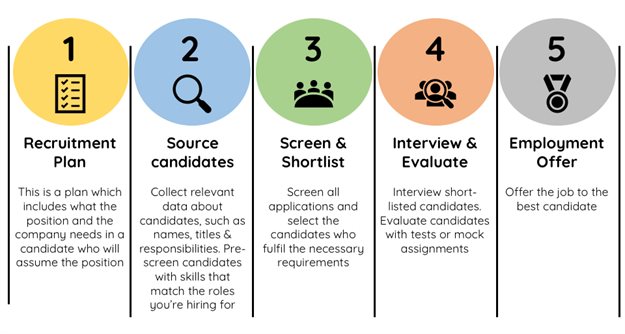
Subscribe & Follow
Jobs
- HR Administrator East Rand
- Human Resources Manager Durban
- HR - Talent Acquisition Durban
SME Recruitment: How to conduct a foolproof job interview
Why interview candidates?
Companies use the interview process to evaluate whether the candidate is a fit for the organisation. At this stage in the recruitment process, you already know that the candidate is suitably qualified for the role, so it’s time to dig further into culture fit and work style. See if you can identify what motivates the candidate, what drew them to your company and how they work with a team. Remember, when you're interviewing people to join your team, you have to get creative. There is only so much that questions like "What's your biggest weakness?" and "Are you a team player?" reveal about who your candidates truly are.
Simple steps to conducting an effective interview
One Week before the interview
- Contact the candidate to set up a suitable time for the interview.
- Tell the candidate what the interview will cover and who they will be meeting.
- Send the candidate a meeting request with the address details and a contact number in case they run into trouble.
- Remember to invite the right internal people in your company to the interview.
- Prepare job-related interview questions and questions that will uncover details about the candidate’s work ethic and disposition.
Remember that the candidate will also be interviewing you! So organised preparation and good communication will ensure your company appeals to the best candidates.
One day before the interview
- Confirm the meeting with the candidate and internal colleagues.
- Read the candidate’s CV so you have a good idea of who you will be talking to.
On the day of the interview
- Thoroughly explain the process to every candidate.
- Make the interview a conversation not an interrogation.
- Take notes in the interview.
- Explain the next steps to the candidate and tell them when they should expect to hear from you next.
After the interview
- Follow up with every candidate! Failing to follow up is rude and inconsiderate, and will damage your brand as an employer.
- Call the candidates’ references- making sure that they are legitimate and recent direct managers.
- Check out the people in the candidate's network; chances are you know someone who knows someone who knows the candidate and can speak to her experience, skills, attitude, etc.

Good interview questions to ask
Aside from good interview organisation, preparation and follow up, it’s important to ask the right questions at the interview that give you good insight into a candidate’s personality and work ethic. Below are some questions that we find work well.
- What do you know about our company and why do you want to work here?
- Pitch our company to me as if I were buying our product/service.
- Tell me about the relationships you've had with the people you've worked with. How would you describe the best ones? The worst?
- What have you done professionally that is not something you'd want to repeat?
- Is it better to be perfect and late, or good and on time?
- What is your definition of hard work?
- Tell me about a time you made a mistake...
- Who is the smartest person you know personally and why?
- What is something you'd be happy doing every single day for the rest of your life?
- What’s the biggest decision you’ve had to make in the past year? Why was it so big?
- Do you have any questions for me?
This will quickly reveal whether the candidate has put in sufficient time to research your company. It also shows whether they are in fact interested in being part of it.
Good answers to this interview question will reveal an accurate definition of your company and an understanding of what it offers your core customer. This question is particularly relevant for salespeople but applicable to any other role too.
Many candidates are hesitant to bad-mouth their coworkers and bosses, so it’s interesting to hear how they navigate a question about their worst working relationships. Look for answers that explain how their colleague’s personality clashed with their own - not simply what their colleague did that benefited or offended them.
This will give you an idea of how they viewed work they weren't very happy with, which is bound to happen to everyone in every job at one point or another.
When you talk about extreme experiences that get people emotional, it can be very revealing about how they manage stress or complexity. What's most important is if they extracted value from the experience despite their willingness to do it again.
For most companies, the correct answer is "good and on time." Output can always be tweaked and improved. Most employers don't want someone who can't hit deadlines because they're paralysed by perfection.
Try to remain neutral as they feel out their response. Ultimately, it's important that they can express how they prioritise their tasks.
A good answer should reveal if your candidate does what it takes to get the task done.
A good answer to this question will do two things well: One, the candidate admits to a genuine mistake. Two, they explain what they learned from it.
This question tests what the candidate values and aspires to by forcing them to think of a real person they know, and then articulate what makes that person smart.
While it's important to hire for skill, it's also important to hire someone who's likely to be happy in the job for which you're hiring.
This is a great way to figure out how a candidate approaches decision-making. Were they quick to make that big decision, or did it take them a long time? Did they spend most of their time reflecting on it by themselves or fleshing it out with others? How did they make a plan?
This is a critical question and, like the one above, you will seeing how candidates think on their feet. The answer to this question also reveals what's important to the candidate. Are they wondering about company culture, or compensation? Are they curious about growth potential, or learning opportunities?
Small-business owners who use these techniques will be able to quickly evaluate whether a candidate has the potential to thrive in a small-business environment.













